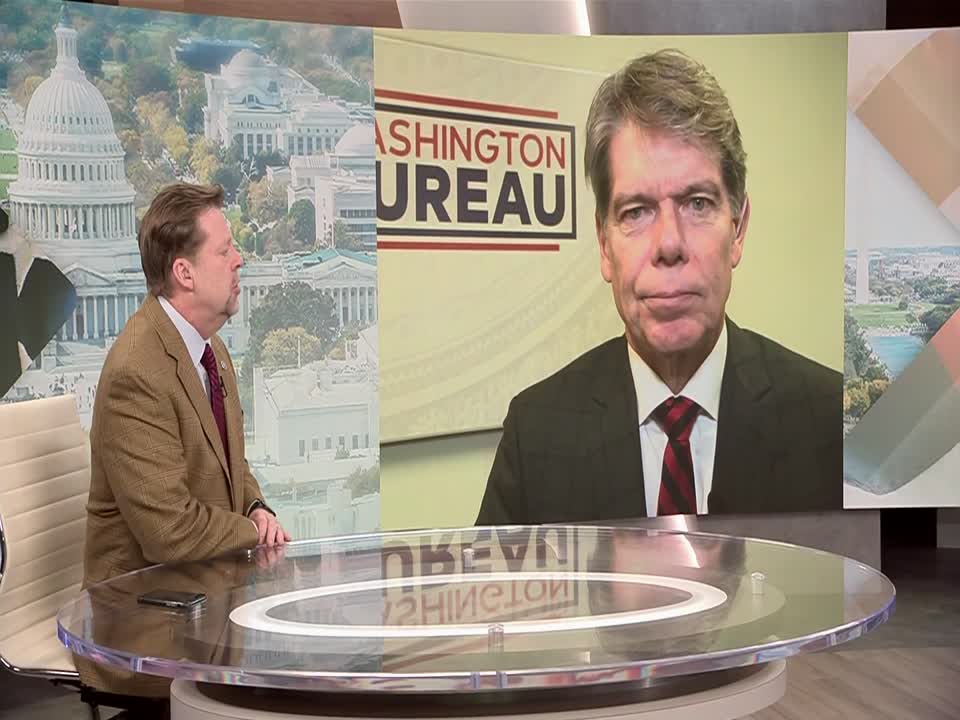D.C. Debrief Extended: D.C. plane crash raises safety concerns, as Trump nominees face scrutiny
Political Analyst Scott Mitchell and Washington Bureau Chief Alex Cameron discuss the deadly plane crash near the Potomac River, its impact on Washington, D.C., the controversy surrounding President Trump's response, the overshadowing of a Republican policy retreat, and the challenges facing Trump's high-profile nominees in confirmation hearings.Sunday, February 2nd 2025, 9:32 am
WASHINGTON, D.C. -
Political Analyst Scott Mitchell and Washington Bureau Chief Alex Cameron discuss the deadly plane crash near the Potomac River, its impact on Washington, D.C., and the controversy surrounding President Donald Trump’s response.
They also break down how the tragedy shifted attention away from a key Republican policy retreat and the challenges facing Trump’s high-profile nominees in their confirmation hearings.
---
The tragic plane crash near the Potomac River on Wednesday night has left Washington, D.C., reeling, marking one of the city's most devastating aviation incidents in decades. The crash, which claimed the lives of 67 people, took place near key federal agencies, including the Federal Aviation Administration (FAA) and the Department of Defense (DOD).
“It was a tough day,” said Cameron, who covered the event from before sunrise to well after sunset. “D.C. has been through this before. It’s been a while.
While the nation mourned, President Donald Trump’s remarks at a press conference sparked controversy. He began by calling for unity and prayers for the victims but quickly pivoted to speculation about whether diversity, equity, and inclusion (DEI) policies from the previous administration played a role in the crash. “Even some of his supporters saying, ‘Why are we going there right now?’” Cameron said.
The tragedy has intensified discussions on air safety, particularly given the heavy air traffic over the Potomac, which includes both civilian and military aircraft. “This is a very busy air corridor,” Cameron said. “We'll see whether there are some changes made in that regard. But certainly, it was a tough story to cover."
Policy Retreat Overshadowed
As the nation focused on the crash, a key Republican leadership retreat in Florida largely went unnoticed. Lawmakers met to discuss pressing legislative goals, including passing a massive reconciliation bill that addresses border security, tax policy, and potentially raising the debt limit.
“There were no major blowups, at least not reported publicly," Cameron said. “So the big question remains, how are they going to be able to achieve the goals they've set."
With House Republicans holding a slim majority—set to narrow further with Elise Stefanik’s expected confirmation as U.S. ambassador—the party will need near-total unity to pass the bill without Democratic support.
Trump Nominees Face Scrutiny
The week also brought contentious confirmation hearings for three of Trump’s high-profile nominees: Robert F. Kennedy Jr. for Secretary of Health and Human Services, Kash Patel for FBI director, and Tulsi Gabbard for Director of National Intelligence.
Gabbard, in particular, faced scrutiny for her past stance on Edward Snowden. "(She) was given an opportunity multiple times during her hearing to say that she thinks he was a traitor and she didn't do it," Cameron said.
Kennedy’s confirmation also remains uncertain. "He said he supports vaccines, but didn't disavow some of the things that he said in the past. Tried to claim at times that he didn't say them, but the record showed otherwise," said Cameron
As the Senate prepares to vote, Trump’s nominees face an uphill battle. “There’s still a tough road ahead,” Cameron said.
More Like This
February 2nd, 2025
February 17th, 2025
February 12th, 2025













